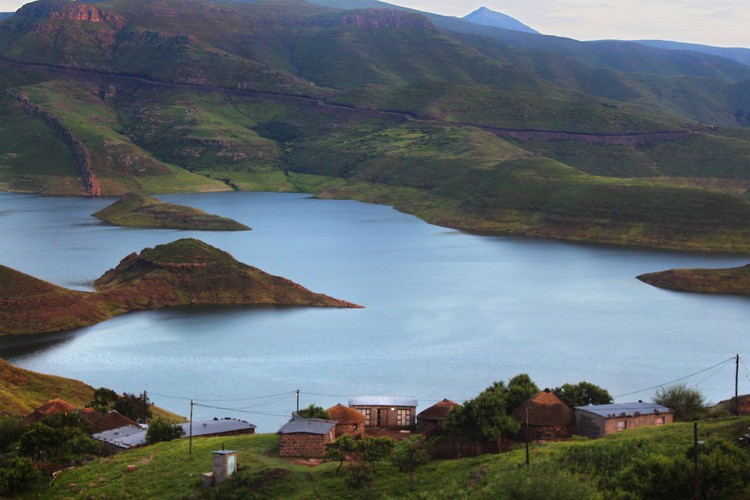
7 October 2025
Families who were moved 20 years ago to make way for the Mohale Dam in the Lesotho Highlands have lost a court battle over compensation. Photo: Sechaba Mokhethi
After more than 20 years, five families displaced by the construction of the Mohale Dam in the mountains of Lesotho have finally had their day in court, only to be told they must share their long-awaited compensation with the community where they live now.
At the centre of the dispute is a long-standing policy of the Lesotho Highlands Development Authority (LHDA), which requires resettled families to share compensation for lost communal assets with the community where they are moved to.
In a recent High Court judgment, the families, who were moved to make way for the construction of the Mohale Dam under the Lesotho Highlands Water Project, lost their case against the LHDA. They had argued that the policy was unjust because their new community did not have comparable communal resources, such as grazing land, to reciprocate.
But the court upheld the LHDA policy as lawful, ruling that the displaced families must share their lump-sum payment of more than M1-million (R1-million) with the Thuathe community, where they were resettled between 2002 and 2004.
This decision, delivered by Justice M.S. Kopo on 21 August 2025, brings an end to a legal battle that had dragged on since 2018. The five applicants, Lakabane Mokoatsi, ‘Malebohang Moqekela, ‘Makopano Mokeki, Tsotang Moqekela, and ‘Mahalio Senne, were among families relocated from the now submerged Ha Seotsa village in Ha Mohale.
In their court submissions, the families said their relocation to Thuathe had caused them severe and irreversible losses, arguing that “their standard of living and income has been lowered”. The principle behind compensation, they said, was to ensure that “the standard of living and the income of persons displaced shall not be reduced” from where they were before the displacement.
They told the court that Thuathe offered none of the communal resources they once relied on. “There are no communal assets where [we] have been resettled to be shared by us and the host community,” they said.
“We are no longer able to keep animals due to the absence of grazing lands, there are no brushwoods, medicinal plants, wild vegetables and useful grasses in the host community.”
They argued that it was unfair to force them to share compensation with people who had not suffered similar losses. Being directly compensated for the communal assets instead of allowing the compensation to be paid to the community with them included, they said, was the only way to restore them “as nearest as possible to their original standard of living”.
To strengthen their argument, the applicants cited the case of the Matala Resettlers affected by the same project, who had been moved to an urban area under the Maseru City Council. In that case, the Ombudsman ruled in favour of the families, finding that they had been resettled in an urban area and there were no communal assets to be shared by the host community.
The Ha Seotsa families insisted their situation was comparable, as Thuathe also lacked communal assets.
In its response, the LHDA said its compensation programme was designed to cover affected households and communities for the loss of “rights and access to communal assets, including grazing, brushwood fuel, useful grasses, and medicinal plants.” It confirmed that the total compensation for the loss of natural resources owed was M1,050,597.
However, the authority maintained that Thuathe is a rural area and therefore subject to a clause in the 1997 Compensation Policy which provides that communal compensation “shall be used for development purposes within the communities”.
The LHDA distinguished the applicants’ case from the Matala one, stating that individual payments were only made to urban resettled households because there were no communal assets to share. In rural areas, however, the policy aimed to “link the resettled households and the host community”.
The LHDA conceded that the families had lost access to some resources from Ha Seotsa, but disputed that Thuathe offered none. The families would benefit from shared infrastructure funded by the compensation, such as water supply systems, schools, community hall, administrative offices and clinics, the LHDA said.
It would be “unfair to burden the resources of the host community with resettled households whilst the resettled households will be enjoying compensation for their communal assets alone.”
The authority argued that it had followed the law and urged the court not to “interfere with the decision of the LHDA to allocate the communal compensation due to the rural community of Thuathe for the benefit of the whole community.”
In her ruling, Justice Kopo concluded that the LHDA’s policy distinction between rural and urban resettled households was lawful.
The court found that since the families had been resettled in a rural area, the LHDA’s requirement for shared compensation was “not against the parent law”.
“The host community together with the resettled households will share the compensation,” Kopo ruled.
The application by Lakabane Mokoatsi and the other families was dismissed with costs.